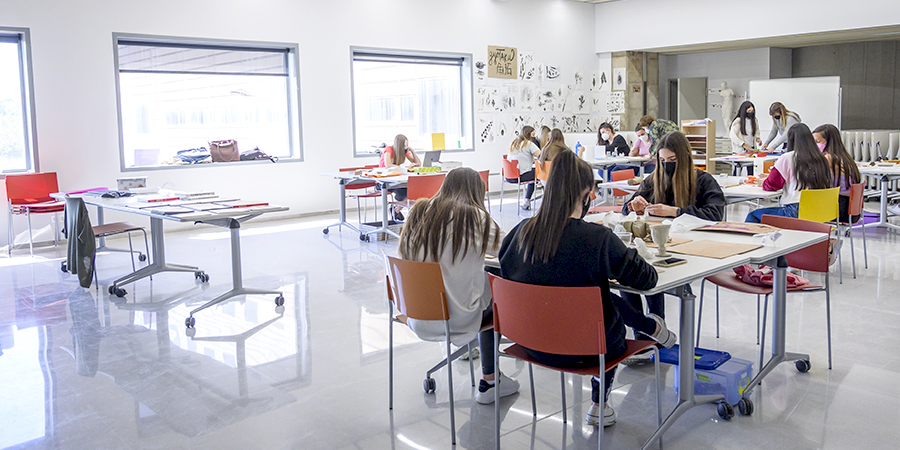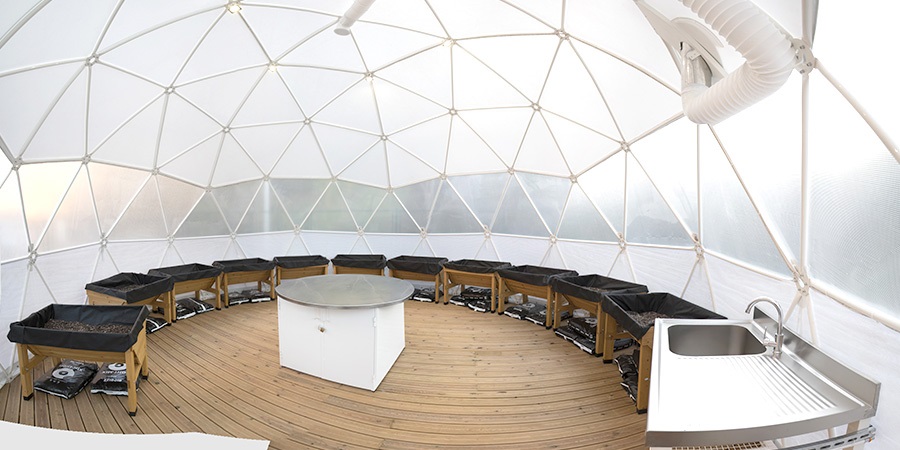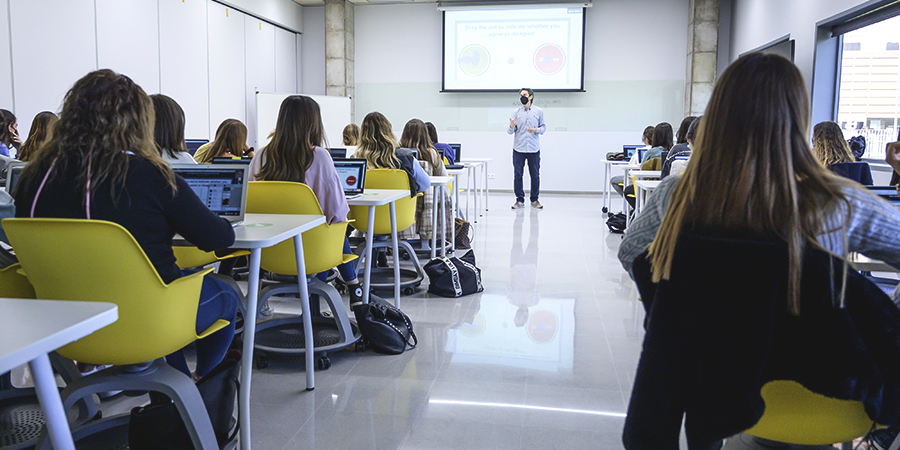- Most viewed
- Last viewed
“A child’s future success in their personal and professional lives passes through the hands of a teacher”
Esther Jiménez has served as dean of the Faculty of Education Sciences at UIC Barcelona since 2016. During this time, she has been chiefly concerned with boosting the prestige of the profession of educator, which she defines as one of society’s most noble, as highlighted, she contends, by the pandemic.
1. COVID-19 has sped up the social, economic and cultural paradigm shift. In broad terms, what are the challenges facing the education sector in this context?
A few months ago, our university bestowed an honorary doctorate upon Verónica Boix-Mansilla, a Harvard professor considered one of the leading experts in global competence and interdisciplinary education. According to her, we live in a global and interconnected world that is facing important challenges such as climate change and migration. Logically, these phenomena also affect schools.
With this in mind, I can highlight three main challenges in the field of education. The first, digitalisation, which the pandemic has shown to be fundamental. The second, globalisation, which in Catalonia translates, for instance, into the need to accept and integrate immigration into the classrooms. And, lastly, I would say inclusion, that is, our duty as teachers to develop each student’s skills and potential regardless of their capacities, to help them become the best version of themselves.
2. Do current university programmes in the field of education take these profound social transformations into account?
In our particular case, we have always striven to make sure that our academic curriculum reflects social change. The curricula for the various degrees in Education we offer include new methodologies and digitalisation as a cross-cutting element. Even since before the pandemic, we have had flexible classrooms equipped with technologies that make it possible, for instance, to connect with universities in other countries. We have also been firmly committed to internationalisation for years and, today, offer bilingual Pre-Primary and Primary Education groups, in which 70% of the subjects are taught in English by lecturers who are either native speakers or have a native level of English. By the time they finish their degree, these students have a C2 level of proficiency in this language. And, of course, we are committed to inclusive education, which is one of the major strategic undertakings and challenges of schools in Catalonia.

3. Should education aim to become more interdisciplinary?
No question. Our faculty is part of the health campus at UIC Barcelona, and that enables us to form synergies with other disciplines such as Bioengineering, Psychology, Medicine, Nursing and Physiotherapy. That sets us apart, because our programme in Education includes training in robotics, first aid, educational psychology and psychomotor education. That helps gives future teachers, in addition to a holistic perspective, a multidisciplinary outlook on issues which are crucial to teaching.
We have also created a double degree in Education and Psychology, the first of its kind in Catalonia, which goes beyond a traditional education curriculum. Understanding, from a psychological point of view, what is going on with a child, the difficulties they might have and how to develop their potential is key to teaching them.
Lastly, being part of a scientific campus enables us to develop our students’ STEM (Science, Technology, Engineering and Mathematics) skills. This is instrumental in developing their passion for science, so that they can transmit this passion to their future students and also foster greater equity among girls and boys in this kind of discipline.
4. The climate emergency and the planet’s environmental future also hold a place of prominence in the public debate. What role should educators play in this regard?
Environmental education is key to reversing the climate crisis. Luckily, there is increasing awareness of these issues. Yet this is not enough. We need in-depth knowledge of how our actions affect the environment.
Our faculty is at the cutting-edge in this regard and has a specific research group that has been exploring issues relating to sustainability, climate change and the environment for years. Also, earlier in the academic year, we inaugurated the geodesic dome, the first facility of its kind in the field of education in Spain, which serves as a classroom for lectures and workshops on topics such as botany, geology, healthy eating and sustainable consumption.

5. How important is teacher training in the education of future teachers?
Work experience is fundamental for any type of professional course of study, and Education is no exception. There would be no justification for a teacher, or a doctor or nurse, to provide a few examples, not to gain work experience before entering the profession. However, in the case of teachers, work placements are particularly important, because they need to know how and why they teach.
Our bachelor’s degree programme includes work-linked training in years two and three, which helps connect theory and practice, raises the students’ level of training and provides the reflection they need to offer high-quality teaching.
In addition to work experience in schools run by the Government of Catalonia, our students may also choose from a wide range of teacher training opportunities abroad, and that opens lots of doors in the job market. Today, over 90% of our students start working within months of graduation.

6. What advice would you give to someone who is considering studying a degree in Education?
Most importantly, that they be aware of the challenge that studying Education entails and that they will be responsible for teaching future leaders, which is no small matter. It is a multidisciplinary profession that requires many skills and is key to the development of our society, as the pandemic has highlighted.
In Finland, which is one of the countries ranked highest by the OECD, it is the students who perform best in secondary school that go on to study Education at university. And that explains the success of their educational model. Here there is still a misguided belief that the best option for those who do not like to study is Education. We need to dispel this notion, because being a teacher is one of the most noble professions there is. Teachers work with the most vulnerable people in our society, children, who are also the people with the greatest potential for development. A child’s future success in their personal and professional lives passes through the hands of a teacher.”